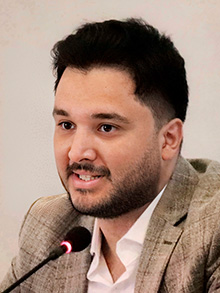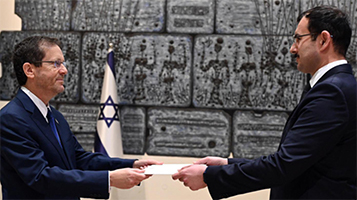
Russia, INSTC and Regional Trade Interconnectivity  By Yeghia TASHJIAN, Beirut-based regional analyst and researcher, columnist, "The Armenian Weekly” By Yeghia TASHJIAN, Beirut-based regional analyst and researcher, columnist, "The Armenian Weekly”
The International North-South Transport Corridor (INSTC), a 7,200 kilometre model of ship network, rail and road project, was initiated in 2000 by Russia, Iran and India to facilitate trade between India, Russia and Europe. Azerbaijan, Armenia and other countries joined the initiative in 2005. This transport corridor aims to reduce the delivery time of cargo from India to Russia and Northern Europe to the Persian Gulf and beyond. Compared to the sea route via the Suez Canal, this route’s distance shrinks by more than half, which brings the term and cost of transportation down. If the present delivery time on this route is over six weeks, it is expected to decrease to three weeks through this corridor.
In my March 2021 analysis “Armenia and India’s Vision of ‘North-South Corridor’: A Strategy or a ‘Pipe Dream?’” I warned that Armenia’s inability to play an active transit role between Russia/Europe and Iran/India will isolate the republic from regional trade. Between 2005-2018, Armenia did little to finalize the north-south strategic highway connecting its northern border to the southern border, mainly due to public corruption and carelessness.
READ MORE
- EGF Editor |
Published on EGF: 05.05.2023
| External Relations
-
The Armenian Government Needs to Communicate Better to the Public what EUMA Is About  By Benyamin POGHOSYAN, PhD, Chairman, Center for Political and Economic Strategic Studies By Benyamin POGHOSYAN, PhD, Chairman, Center for Political and Economic Strategic Studies
Efficient strategic communication has become necessary in the South Caucasus as the governments of the region and outside regional and global powers vie for influence in the current highly complex geopolitical realities. One of the priorities for the Armenian government is to explain clearly to public opinion what the recently deployed EU Monitoring Mission is and is not about. Otherwise, the same disappointment that emerged towards Russia earlier will surely appear as regards the European Union also.
The ups and downs in the Armenia – Azerbaijan negotiations process after the end of the 2020 Nagorno Karabakh war, the launch of the Russia – Ukraine war, and the complete rupture of Russia – West relations added complexity to the geopolitical realities of the South Caucasus. Too many actors have contradicting interests in region – Russia, the US, the EU, Iran, Turkey, and Israel.
READ MORE
- EGF Editor |
Published on EGF: 06.05.2023
| Security
-
Geopolitical Choices of Armenia amidst the Transformation of Post-Cold War Global Order  By Benyamin POGHOSYAN, PhD, Chairman, Center for Political and Economic Strategic Studies By Benyamin POGHOSYAN, PhD, Chairman, Center for Political and Economic Strategic Studies
The end of the Cold War and the collapse of the Soviet Union have ushered in hopes of humanity's happy and harmonious future. The ideas such as "End of history" (Fukuyama, 1992) became very popular both within academic circles and policymakers. There was a widespread belief that the entire planet would live under liberal democracy, and interstate conflicts will become bad memories from history. The last decade of the 20thcentury seemed to confirm those hopes. The EU and NATO enlargement, market reforms informer socialist states, cooperative relations between Russia and the West, and the growing US –China economic cooperation have seemingly justified hopes for establishing the world united under the banner of liberal democracy. READ MORE
- EGF Editor |
Published on EGF: 27.04.2023
| External Relations
-
Azerbaijani-Iranian Tensions Disrupt the South Caucasus
 By Fuad SHAHBAZOV, Baku-based independent regional security and defence analyst By Fuad SHAHBAZOV, Baku-based independent regional security and defence analyst
On March 30, Azerbaijan officially inaugurated its first embassy in Tel Aviv, Israel, after avoiding the move for three decades. Although the decision highlighted the importance of Azerbaijani-Israeli relations, it quickly became a catalyst behind the renewed war of words between Iran and Azerbaijan. Since 2021, diplomatic relations between Tehran and Baku have steadily become embittered. Iran is primarily concerned with the decline of its influence in the South Caucasus, which has suffered since the end of the Second Karabakh War in 2020. As such, in an attempt by Tehran to flex its muscles and intimidate Azerbaijan, the Islamic Revolutionary Guard Corps conducted large-scale military drills on the border with Azerbaijan in October 2022. Unlike previous years, the exercises provoked an uneasy reaction within Azerbaijan and triggered anti-Iranian sentiments throughout the country. READ MORE
- EGF Editor |
Published on EGF: 27.04.2023
| Security
-
The Place of Uyghur and Kurdish Issues in Sino-Turkish Relations  By Vusal GULIYEV, Visiting Research Fellow at the Asian Studies Center of Boğaziçi University By Vusal GULIYEV, Visiting Research Fellow at the Asian Studies Center of Boğaziçi University
In late December 2022, Türkiye’s Foreign Minister Mevlüt Çavuşoğlu, raised the Uyghur issue at an end-of-the-year press briefing by questioning whether Xi Jinping’s government had failed to keep a promise made five years ago. The Uyghur issue concerns events that began in 2017, in which the accusations against the Chinese government’s crackdown on thousands of Uyghurs in detention camps under the guise of an anti-terrorist operation has started. The promise of which Çavuşoğlu spoke was an unfettered visit by a Turkish to the Xinjiang Uyghur Autonomous Region (XUAR). However, that promise has not been kept because of the myriad of requirements placed on the visit by China, such as predetermining the places to be visited.
READ MORE
- EGF Editor |
Published on EGF: 27.04.2023
| External Relations
-
Israel and Azerbaijan: Trusted Friends and Reliable Partners  By Eugene KOGAN, Tbilisi-based defence and security expert By Eugene KOGAN, Tbilisi-based defence and security expert
Israeli-Azerbaijani relations are based on two main pillars: patient and cordial political relations as well as defence cooperation and arms sales. While the former reached a more intensive level this year, with the opening of an Azerbaijani embassy in Tel Aviv in late March, the latter pillar of the relationship was well developed long before, as Israel became Azerbaijan’s largest weapons supplier.
After decades of keeping a low diplomatic profile vis-à-vis Israel, in November 2022 the Azerbaijani parliament approved a bill on opening an embassy in Tel Aviv. This was a historic decision as, until then, Azerbaijan had consistently rejected Israeli overtures to send a permanent ambassador, despite the opening of an Israeli embassy in Baku in August 1993. It took almost 30 years for Azerbaijan to reciprocate since the country’s leadership did not want to alienate other Muslim-majority states or provoke the Iranian authorities, who blamed Israel for worsening relations along the Baku-Tehran axis. However, in the wake of the 2020 signing of the Abraham Accords on diplomatic normalization between Israel and Bahrain, Morocco, Sudan, and the United Arab Emirates, followed by the exchange of Israeli and Turkish ambassadors two years later, Azerbaijan’s President Ilham Aliyev felt that the time was right to follow suit. READ MORE
- EGF Editor |
Published on EGF: 15.04.2023
| External Relations
-
Prospects for Armenia-Turkey Normalization  By Benyamin POGHOSYAN, PhD, Chairman, Center for Political and Economic Strategic Studies By Benyamin POGHOSYAN, PhD, Chairman, Center for Political and Economic Strategic Studies
The devastating earthquake in Turkey, and Armenia's decision to provide humanitarian assistance and send rescue teams, have however opened a new window of opportunity for revitalizing the stalled [normalization] process". "Turkey assessed the Armenian government's gesture positively, and the Armenian foreign minister's visit to Turkey made it possible to advance the implementation of agreements reached in 2022. And yet, "earthquake diplomacy" will not lead to short-term breakthroughs in bilateral relations.
Devastating earthquakes of 7.8 and 7.5 magnitudes struck southern Turkey on 6 February 2023. By 10 April, the death toll had passed 50,000, while the number of wounded passed 100,000. More than 12,000 buildings were destroyed, and large-scale rescue operations were underway. Besides the immense human tragedy, the earthquake had domestic and foreign policy implications for Turkey. The country faces crucial presidential and parliamentary elections scheduled for 14 May. READ MORE
- EGF Editor |
Published on EGF: 15.04.2023
| External Relations
-
Is War between Iran and Azerbaijan Out of the Question?
 By Fuad SHAHBAZOV, Baku-based independent regional security and defence analyst By Fuad SHAHBAZOV, Baku-based independent regional security and defence analyst
Tensions between Azerbaijan and Iran have grown rather raw recently in the wake of Baku’s inauguration of its first-ever embassy in Israel. Of course, diplomatic relations between the neighbours have steadily become more and more inflamed and embittered for several years now, with Iran concerned at the declining influence in the South Caucasus it has suffered since the second Karabakh war between Azerbaijan, urged on by Turkey, and Armenia in late 2020. And with a normalisation of diplomatic ties between Tehran and Baku unlikely in the near future, the big question remains unanswered: Is it possible that the tensions could escalate into a large-scale regional conflict?
The war of words between the two countries was aggravated in October 2022 when Iran's Islamic Revolutionary Guard Corps (IRGC) conducted large-scale military drills on its border with Azerbaijan. Baku opted to refrain from responding to the exercises with comments that might antagonise Tehran. However, the situation became even more explosive when, in late January, an Iranian citizen armed with a rifle burst into the Azerbaijani embassy in Tehran and killed the building’s security chief and injured two of his colleagues. READ MORE
- EGF Editor |
Published on EGF: 15.04.2023
| Security
-
A Political DEPREM? The Impact of the Earthquake on Turkiye’s Domestic Politics  By Yeghia TASHJIAN, Beirut-based regional analyst and researcher, columnist, "The Armenian Weekly” By Yeghia TASHJIAN, Beirut-based regional analyst and researcher, columnist, "The Armenian Weekly”
2023 marks the centennial of the establishment of the Republic of Turkey, when the Turkish Grand National Assembly led by Mustafa Kemal Atatürk proclaimed the establishment of the republic and the abolishment of the Caliphate that ruled Ottoman Turks for six centuries. For decades, the Kemalists and military-backed governments ruled Türkiye with a secular iron hand. It wasn’t until 2002, when the conservative Justice and Development Party (AKP) came to power that Kemalists’ monopoly on power was challenged, ending decades of unstable coalition governments. AKP’s early years were relatively peaceful, as the country experienced fast economic growth and continued openness to the West. However, as the authorities began facing domestic and regional challenges, illiberal democracy started to consolidate itself in Türkiye. In 2013, protests erupted in opposition to building a shopping mall in Istanbul’s Gezi Park. The government violently cracked down on the movement and began limiting civil liberties and curtailing press freedoms. Moreover, a failed coup attempt in 2016 consolidated authoritarianism in the country.
READ MORE
- EGF Editor |
Published on EGF: 15.04.2023
| External Relations
-
Azerbaijan’s Efforts to Digitalize the Middle Corridor  By Vusal GULIYEV, Visiting Research Fellow at the Asian Studies Center of Boğaziçi University By Vusal GULIYEV, Visiting Research Fellow at the Asian Studies Center of Boğaziçi University
Located at a key geopolitical and geo-economic point in the Silk Road region, Azerbaijan has been a main initiator in the development of technologically advanced and economically viable trans-border logistics and transit services. This is largely due to Baku’s embrace of a wide spectrum of digitalization and innovation initiatives within the broad-based connectivity framework of the Middle Corridor Initiative (MCI) and other similar such projects. This IDD analytical policy brief will examine various aspects of this important topic as it relates to MCI.
Seizing new opportunities in the digital era whilst developing better measures to boost the digital economy and trade with embedded innovation and emerging technologies has become one of Azerbaijan’s top priorities in the past few years. In the wake of significant government-backed digital transformation efforts, special attention is now being placed on enhancing the variety of logistics services on offer, building cutting-edge infrastructure, and upgrading domestic communication systems.
READ MORE
- EGF Editor |
Published on EGF: 15.04.2023
| External Relations
-
|
|
